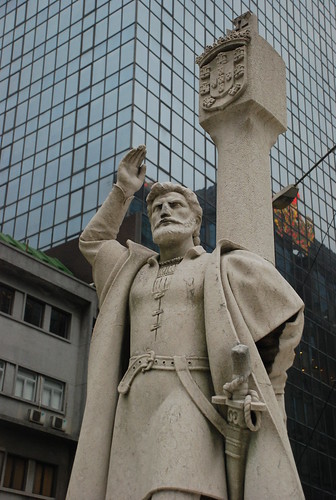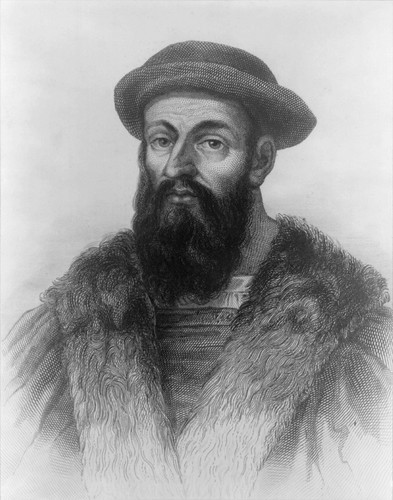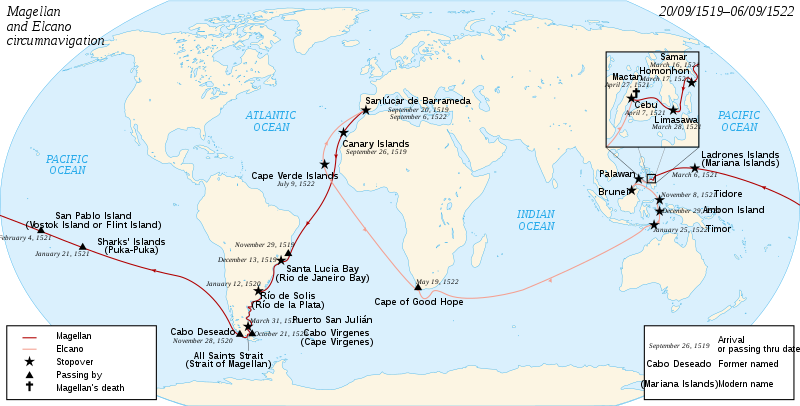The man in the statue in your photo is unlikely to be Magellan. Magellan never came anywhere near Macau in his voyage round the world. He actually was killed by poison arrows in the Philippines. Are you sure it is not Alvarez, who discovere Macau 7 years before Magellan circled the globe?
Alvarez

Portuguese Trade Routes

Magellan

Magellan's voyage

Quote: gamblerI always like how Pacomartin does so much research on things. I tend to take what I read on the web for granted.
When I was a kid, James Michener wrote a travelogue called Iberia (1968) about Spain and Portugal and the beginnings of mass market air travel in the 60's (Spain was the destination of choice for an inexpensive vacation in the early 60's). Since it was the beginning of the sexual revolution it was partly about the idea of a vacation by northern Europeans who often wanted a fling with a southern Spaniard which was then a somewhat exotic culture.
But I do remember Michener arguing that Magellan was the first person to circumnavigate the globe. On the voyage depicted in the chart he was murdered in the Philippines. His Navigator, Elcano, was one of only 18 people that showed up in Spain. The emperor Charles V, gave an award to Elcano and his men for being the first to circumnavigate the globe. I think there were 250 people that started out and only 18 that made it the whole way (although a few others showed up in later months). Michener argued that Magellan had been on a voyage previously around Africa and through the Indian ocean where he had gone to the Banda islands which were further east than the longitude where he died. Hence Magellan had actually gone through all the longitudes of the world, but over his whole life, not in a single three year journey.
But none of them had actually gone to China. The trade in silk and jade was overshadowed by the trade in spice originally. They were more interested in the Philippines. Interestingly enough Elcano tried to repeat the voyage, and he also died in the Philippines just like Magellan (five years later) after crossing the Pacific ocean. He also had a similar massive death toll. No one tried to circumnavigate again until Sir Francis Drake surprised everyone by doing it decades later, robbing and pillaging the entire trip.
The spice trade was the moving force behind the crusades, the trading in slaves, the establishment of religious orders to protect pilgrims, and most of Europe's commerce and geographical explorations.Quote: pacomartinThe trade in silk and jade was overshadowed by the trade in spice originally.
The profit potential in the spice trade was far beyond any other alternatives.
Quote: pacomartinWiz,
The man in the statue in your photo is unlikely to be Magellan. Magellan never came anywhere near Macau in his voyage round the world. He actually was killed by poison arrows in the Philippines. Are you sure it is not Alvarez, who discovere Macau 7 years before Magellan circled the globe?
You certainly keep me on my toes. I like that. My Venetian Macao page has been updated to note your claim about Alverez.
Regarding James Michener, have you read his other books? I've read several of them. My favorite is Hawaii. Worst is Space.
So I surfed over to the Venetian Macao page.
Maybe that's the Italian way to spell Macau?Quote:The Venetian Macao (they spell it with an O there, unlike most places)
Um, yeah, whatever.Quote:
With the roaming muscians.
I didn't know I would look like such a dork when I posed, but this is how everybody poses in China.
OK. Now I'm impressed.Quote:
My favorite moment at the Venetian was passing juggling pins with their jester.
Somebody in a suit offered me a job afterward.
Quote: WizardRegarding James Michener, have you read his other books? I've read several of them. My favorite is Hawaii. Worst is Space.
When I was young I read a lot of them. Hawaii, The Source, Poland, Iberia, the one about Afghanistan, The Drifters, The Bridges at Toko-ri, and Caribbean. Up until he was about 65 he still had a lot of power. After that he became such an institution that he was simply surrounded by researchers and guides every time he went to a country. The stories became a lot thinner after that.
I always liked Iberia because writing in the mid 1960's in the world of package tours he was always thinking back to his visits in the 1930's, through the 1950's. The extreme poverty of Spain when he rode the trains in the 1930's. It is hard to imagine looking at present day Spain, but starvation was a real danger. The isolation of Spain in the 1950's when Franco was at his peak power. He described newspapers in Madrid as being less informative than a high school newsletter. Information was so tightly controlled.


